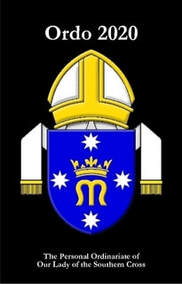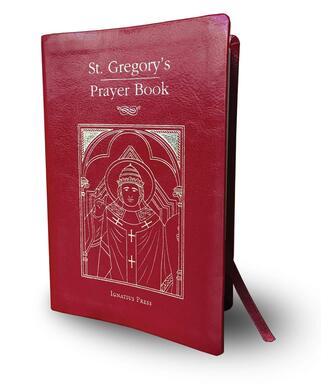The Personal Ordinariate of Our Lady of the Southern Cross.The Homepage of the Personal Ordinariate of Our Lady of the Southern Cross is at http://www.ordinariate.org.au/ where you will find more details about where to find parishes of the Ordinariate around Australia, how to become a member of the Ordinariate, how to contribute to the Ordinariate, and, of course, the latest news.
|
Formed.org
Formed.org - For more information about the parish's access to this wonderful Catholic streaming service, please see our Faith Formation page. Formed.org is able to be cast using Chromecast to your television.
Ordo 2020The Ordo for 2020 of the Personal Ordinariate of Our Lady of the Southern Cross contains all the references to the Readings, Rubrics and Prayers for the Divine Office and Mass for each day of the Year. In order to give you all the resources needed to pray the Divine Office, Ordo 2020 has the entire Coverdale Psalter, the Collects, the Office Hymns, the Antiphons and Canticles for the Offices of Mattins, Terce, Sext, None, and Evensong, as well as the Office of the Dead, the Litany, Occasional Prayers and Thanksgivings, and An Order of Compline. Ordo 2020 is available as a paperback book, or as a PDF download.
|
St. Gregory's Prayer BookFor around $35.00, you can obtain a copy of the magnificent St. Gregory's Prayer Book from amazon.com.au, or from bookdepository.com (the price will vary based on the exchange rates). It is full of the most beautiful prayers, written in the most beautiful English, a worthy way to pray and to give God the honour due unto his Name.
|
Using the St. Gregory's Prayer Book
In his First Letter to the Thessalonians, Chapter Five, Verse 16, Saint Paul tells us to "Rejoice always, pray without ceasing…" That great Anglican Poet and Divine George Herbert (1593-1632) puts that same injunction in the third verse of his famous hymn, "King of Glory, King of Peace":
Sev'n whole days, not one in sev'n,
I will praise Thee;
In my my heart, though not in heav'n,
I can raise Thee.
Small it is in this poort sort
To enroll Thee:
E'en eternity's too short
To extol Thee.
The St. Gregory's Prayer book is the result of a number of years worth of labour on the part of an international team among the three Personal Ordinariates. Their aim was to create a book of prayers for everyone in the Ordinariates and beyond, that would express that arm of the English Patrimony which aims to help us follow the aim of praying without ceasing. A particular concern for them was that this book not be just for the clergy, and religious, but primarily for the laity. Thus, everyone is encouraged to use these prayers regardless of their state in life.
Generally speaking, as noted in the Preface, the liturgical life that we have inherited in our tradition is one of sobriety, decency, and is rather, on the whole, restrained. The Divine Office, Mattins and Evensong, are beautiful expressions and acts of worship of Almighty God. They are well-ordered, and contain in themselves means for sanctifying the day. There is no greater prayer, of course, than the offering of the Holy Sacrifice of the Mass. Primarily, these three great hinges of the daily round of the Church's prayer are very much public in nature. They demand community. The whole of our prayer lives, flowing from and returning to the Eucharist, and guided by the Divine Office's instruction, however, require an unceasing work of prayer. The Church, too, enjoins us to make our lives an act of prayer, because prayer is our relationship with God. That is where this devotional book helps us.
We pray with our whole being: through our bodily posture, in our emotions, with our heart and mind, and with our whole soul. Primarily, though, what we require is that food of thought, habits, words, understandings, that form us in prayer. If prayer is our relationship with God, then there are certain words that may be said over and over again. Just as one says, "I love you", not once, but endlessly, in our close human relationships, so too, one may repeat over and over those kinds of loving phrases and words that express our prayer. Our Lord himself gave us a form of address to God in the Our Father. The Archangel Gabriel gives us the form of address to Our Lady. Jesus demonstrates intercessory prayer when he says, "I have prayed for you, that your faith may not fail." St Paul and the Synoptic Gospels, for instance, all recall the words used to consecrate the Eucharist. Within the New Testament we find traces of the earliest prayers, even in the introductions St Paul makes - "Blessed be the God…" "Grace and peace to you…" and so on. So we have ample reason to trust that forms of words may be used as prayer, remembering always that such prayers are not magic - they don't put God in debt to us - they aren't talismans to ward off evil - they aren't, of themselves, enough. The forms of words we use require the simultaneous movement of our heart and that we have intention behind them. This combination we more familiarly term, "Devotion."
What's in the St. Gregory's Prayer Book?
Check out the PDF link below to find out more:
Sev'n whole days, not one in sev'n,
I will praise Thee;
In my my heart, though not in heav'n,
I can raise Thee.
Small it is in this poort sort
To enroll Thee:
E'en eternity's too short
To extol Thee.
The St. Gregory's Prayer book is the result of a number of years worth of labour on the part of an international team among the three Personal Ordinariates. Their aim was to create a book of prayers for everyone in the Ordinariates and beyond, that would express that arm of the English Patrimony which aims to help us follow the aim of praying without ceasing. A particular concern for them was that this book not be just for the clergy, and religious, but primarily for the laity. Thus, everyone is encouraged to use these prayers regardless of their state in life.
Generally speaking, as noted in the Preface, the liturgical life that we have inherited in our tradition is one of sobriety, decency, and is rather, on the whole, restrained. The Divine Office, Mattins and Evensong, are beautiful expressions and acts of worship of Almighty God. They are well-ordered, and contain in themselves means for sanctifying the day. There is no greater prayer, of course, than the offering of the Holy Sacrifice of the Mass. Primarily, these three great hinges of the daily round of the Church's prayer are very much public in nature. They demand community. The whole of our prayer lives, flowing from and returning to the Eucharist, and guided by the Divine Office's instruction, however, require an unceasing work of prayer. The Church, too, enjoins us to make our lives an act of prayer, because prayer is our relationship with God. That is where this devotional book helps us.
We pray with our whole being: through our bodily posture, in our emotions, with our heart and mind, and with our whole soul. Primarily, though, what we require is that food of thought, habits, words, understandings, that form us in prayer. If prayer is our relationship with God, then there are certain words that may be said over and over again. Just as one says, "I love you", not once, but endlessly, in our close human relationships, so too, one may repeat over and over those kinds of loving phrases and words that express our prayer. Our Lord himself gave us a form of address to God in the Our Father. The Archangel Gabriel gives us the form of address to Our Lady. Jesus demonstrates intercessory prayer when he says, "I have prayed for you, that your faith may not fail." St Paul and the Synoptic Gospels, for instance, all recall the words used to consecrate the Eucharist. Within the New Testament we find traces of the earliest prayers, even in the introductions St Paul makes - "Blessed be the God…" "Grace and peace to you…" and so on. So we have ample reason to trust that forms of words may be used as prayer, remembering always that such prayers are not magic - they don't put God in debt to us - they aren't talismans to ward off evil - they aren't, of themselves, enough. The forms of words we use require the simultaneous movement of our heart and that we have intention behind them. This combination we more familiarly term, "Devotion."
What's in the St. Gregory's Prayer Book?
Check out the PDF link below to find out more:
| st_gregorys_prayer_book.pdf | |
| File Size: | 114 kb |
| File Type: | |



